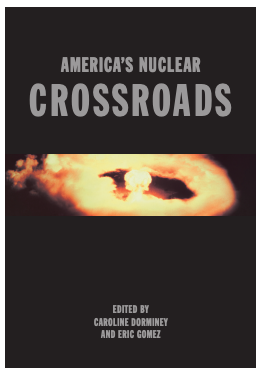For Cato scholars, producing a book is a labor of love, but the labor doesn’t end with the book’s release date. These volumes are not produced merely to sit on shelves, of course. Part of the purpose is to spread them far and wide and reach as many readers as possible, with an emphasis on students and policymakers.
One such recent release is America’s Nuclear Crossroads, an anthology edited by Caroline Dorminey and Eric Gomez that seeks to address key questions of nuclear weapons policy for the 21st century. (See “Taming the Destroyer of Worlds,” Cato Policy Report, September/October 2019.)
As part of the promotion for this book, Gomez has undertaken a nationwide tour. In New York City, he participated in a roundtable event at the EastWest Institute and a panel hosted by New York University. In upstate New York, he spoke to Syracuse University’s chapter of the John Quincy Adams Society (JQAS) and has two presentations scheduled at the State University of New York—Geneseo. In Boston, Gomez participated in a workshop with the Nuclear Weapons Working Group at the Massachusetts Institute of Technology. In Virginia, he delivered a guest lecture at George Mason University in Fairfax and a speech to William & Mary’s JQAS chapter in Williamsburg.
In Los Angeles, Gomez spoke at a debate as part of the Pacific Council’s annual PolicyWest conference and at Pomona College, the University of Southern California, and the RAND Corporation. In Colorado, Gomez presented at the University of Denver as part of a conference on international security studies. Gomez is slated for several additional events in 2020. He has been invited to attend a dialogue on U.S.-Chinese relations at Tsinghua University in January to address the nuclear aspects of the U.S.-Chinese relationship and nuclear diplomacy with North Korea. Additional tentatively planned engagements include multiple on-campus events in Texas and New Jersey.
 Reaching new audiences and forging new relationships is a crucial part of the work done by Cato policy scholars. At Pomona College, a professor in the theater department attended the talk and was impressed by Gomez’s ability to convey complex concepts about nuclear deterrence to those like her who are unfamiliar with the subject matter.
Reaching new audiences and forging new relationships is a crucial part of the work done by Cato policy scholars. At Pomona College, a professor in the theater department attended the talk and was impressed by Gomez’s ability to convey complex concepts about nuclear deterrence to those like her who are unfamiliar with the subject matter.
Additionally, participation at the early October event for the Pacific Council led to several more Crossroads-related events for when he returned to Los Angeles in November. One of those events, in turn, produced a connection with a U.S. military officer who was able to connect Gomez with the Strategic Command’s Deterrence and Assurance Academic Alliance. As Christopher Preble, vice president for defense and foreign policy studies, explains, “Such cascades of new relationships resulting from promotional events outside the DC area are a frequent occurrence.”

This work is licensed under a Creative Commons Attribution-NonCommercial-ShareAlike 4.0 International License.